Many self-employed entrepreneurs don’t think much about insurance, especially if they don’t have a company office, car, or employees. However, e-commerce insurance is not something that is merely “nice to have” but rather a necessity that can directly impact sales and growth. In fact, many leading online retailers such as Amazon, eBay, and Walmart require entrepreneurs to purchase e-commerce insurance, although these requirements can vary depending on how much net income a person generates per month. Let’s look at what every entrepreneur should know about ecommerce insurance.
What Every Entrepreneur Should Know About Ecommerce Insurance
Ecommerce insurance covers many of the same things that regular business liability insurance would cover, as many online sellers face the same risks as brick-and-mortar companies. It can cover legal costs in the event a customer sues over a defective product or a product that has caused an injury or accident. Even if the lawsuit is frivolous in nature, it can cause significant reputational damage to a seller unless her or she has insurance to settle the suit before it generates too much publicity. What’s more, many online sellers are even more vulnerable to lawsuits than the average business owner, as entrepreneurs often operate as sole proprietors rather than registering the business as a limited liability company. Sole proprietorships do not protect a seller’s assets if he or she is sued, which means that a lawsuit could not only wipe out the business but also the entrepreneur’s personal assets.
What Can It Cover?
Ecommerce insurance can also cover damaged, lost, and/or stolen merchandise, be it merchandise that is being shipped to a consumer or merchandise shipped from a wholesaler to the entrepreneur. It covers vendor supply chain delays if products cannot be shipped in time, and it covers cases where products are ordered but cannot be supplied due to supply chain problems. Furthermore, e-commerce insurance can provide cyber insurance coverage in the event an entrepreneur’s business computer is hacked or breached. Given the fact that nearly two out of three companies around the world have experienced at least one type of cyberattack, the odds are that even a careful, conscientious seller could experience a devastating breach. In such an instance, a seller would need to not only cover the costs of repairing or replacing hardware and software but also deal with legal action if the breach leaked consumers’ or business partners’ personal and/or financial information.
Looking at the Policy
An entrepreneur who decides to purchase e-commerce insurance will want to check the policy carefully to ensure it meets his or her current and future needs. If a seller sells and ships items overseas, it is important to ensure the insurance company knows which countries the entrepreneur does business with and how much income is typically generated from sales in any given country, so it can provide insurance on an international level. If new products/services are added, the insurer will need to be informed, so the insurance policy can be updated to include the new goods and/or services for sale. Sellers who sell items that could be dangerous if misused should be prepared to pay more than companies that sell items that don’t usually cause injuries.
E-commerce insurance is designed to provide the protection online sellers need in order to do business long-term. It may seem like just another business expense, but it can save an entrepreneur thousands or even millions of dollars. Anyone who intends to generate income online should carefully consider the policy options and pick one that suits his or her specific needs and requirements.




